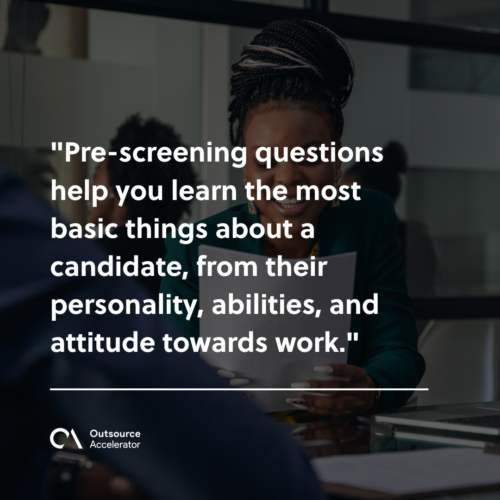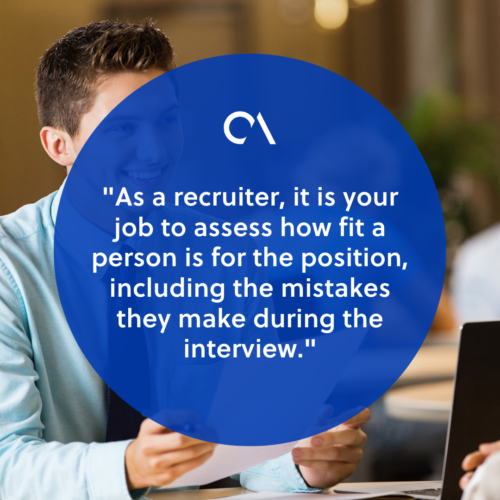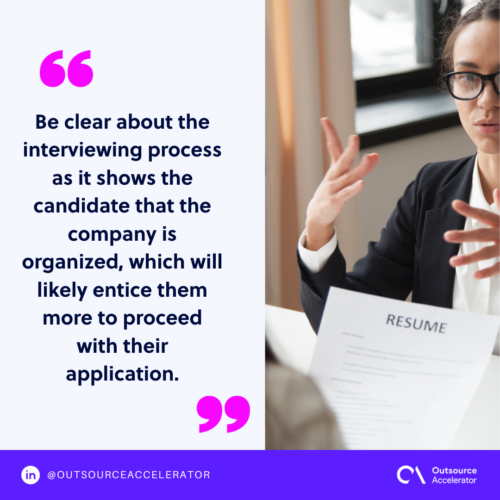Pre-screening interview questions for recruiters

Interviews are some of the most nerve-wracking moments applicants go through before landing a job. It can take a lot of time and preparation to come up with the best answers.
However, the pre-screening interview is just as important for the recruiter as it is for the candidate.
As the recruiter or hiring manager in charge, you must come up with the best questions that will fully gauge an applicant’s competency and capabilities.
If you are a recruiter preparing for an interview, consider this list of pre-screening interview questions to help you find the best potential candidate.
Why ask pre-screening interview questions?
You wouldn’t hire someone without getting to know them first, right?
First impressions are everything, even in job interviews. What better way to judge how a potential candidate is than with these preliminary questions?
Pre-screening questions help you learn the most basic things about a candidate, from their personality, abilities, and attitude towards work.

How to conduct a pre-screening interview
A pre-screening interview can be done over the phone or via a scheduled in-person or virtual interview.
If your company is busy and cannot make time to do personal interviews, you can opt for an online questionnaire instead.
As the interviewer, it is important to take note of the candidate’s answers and capabilities as you go along the interview process. These will be helpful for the hiring manager to assess if the candidate is fit for a second interview.
If you plan on sending out a questionnaire, in addition to the preliminary questions, keep the questions relevant to the job position only. Questions outside of that may turn your candidate away from you.
Furthermore, keep the interview short and sweet. After all, this is only a pre-screening interview where you try to gauge how capable your candidate is.
Keep the questions short but relevant, as anything outside of that may be a turn-off to the candidate.
General pre-screening interview questions
A pre-screening interview is a preliminary step before the actual job interview, where you learn some basic qualities of the candidate.
These questions help you learn more about the candidate on a surface level before going in-depth about specific qualities suited for the job.
This is the first step in learning about the candidate’s personality and skill set. Some examples of pre-screening interview questions are listed below:
- Can you tell me more about yourself?
- How did you find out about our company?
- Can you tell me about your previous work experience?
- Why are you interested in this role?
- What do you hope to gain from this position?
- Why do you think you would make a good fit for this role?
- What is your ideal work environment?
- What are your strengths and weaknesses?
- How do you handle stress?
- What is your expected salary range?
Pre-screening interview questions related to professional and work experience
Once you have a general idea about who your candidate is and how they conduct themselves, you can proceed to the next round of questions.
These questions are more specific and cater to responsibilities related to the job. You may also ask for more details regarding the applicant’s previous work or academic experience.
Listed below are some pre-screening interview questions to help you learn about the candidate’s professional and previous work experience:
- Can you tell me more about your experience with ____?
- What tasks were you responsible for at your previous job?
- Can you describe your typical day at work.?
- What industry-related tools do you have experience with or are familiar with?
- What’s the biggest challenge you’ve had to face from your previous work experience?
- How do you prioritize your tasks?
- What is your leadership style?
- What career accomplishments will help you succeed in this position?
- Can you tell me about a problem you experienced with a coworker? How did you resolve it?
- How would you manage multiple deadlines?
- Can you describe your work style?
- How do you respond to feedback?
Pre-screening interview questions: Red flags to look out for
As a recruiter, it is your job to assess how fit a person is for the position, including the mistakes they make during the interview.
Use this chance to take note of any interviewee red flags as well. If you notice any of these signs in your candidates, they may not be the best fit for the role.

Not asking any questions
Companies like when candidates ask questions as it shows their interest in the position. Not asking any questions may be a sign that the interviewee is uninterested or won’t take the role seriously.
Furthermore, your company may just be one of the many that the candidate applied to and is not their first choice.
Talks badly about the previous employer
There’s no room for negativity during a job interview. If the candidate talks badly about their previous employer, it is a clear sign of unprofessionalism.
Instead, focus on candidates who talk about how their previous job helped them grow and learn more. Listen if they mention how their previous job has helped them prepare for this new one as well.
Only talks about pay
If the interviewee only talks about salary or benefits, it could be a sign that they are not taking the job seriously and are only in it for the rewards.
It may also show that they are not enthusiastic about the job or growing with the company.
Does not give references or previous work experience
Candidates who are transparent about their previous work experience are ideal, so withholding any references or details about it may raise some suspicions and may come off as dishonest.
You don’t want to have to do some extra digging on the candidate’s background only to learn something that they kept from you.
Pre-screening interview tips for recruiters
It’s understandable to be nervous during a job interview, even if you are the one conducting the interview.
Either way, it always pays off to be prepared. Consider these tips when conducting a pre-screening interview to ensure everything goes well.
Have the questions ready beforehand
Preparing your questions ahead of time ensures that the interview flows smoothly and you get the information you need in a short amount of time.
As mentioned earlier, ensure the interview doesn’t take too long, and you can save a lot of time by preparing your questions beforehand.
Once you have a good list of questions that you think will give you all the information you need, all that’s left is to ask the interviewees and listen to their answers.
You may also insert some questions not included in your original list if the candidate mentions something you want to know more about. Doing so will help you gain more insight into your interviewee on the spot.
Create a screening checklist
A screening checklist will help you narrow down your options of who the best candidate is. It is useful if you have many candidates to keep track of.
The criteria can vary depending on the company position and interviewer, so what to include is up to your discretion.
You will have a clearer understanding of which candidate is more qualified than the other until you find the best options.
Be professional and organized
It is not just the candidate who must remain professional. As the interviewer, it is your job to maintain professionalism as well.
Be clear about the interviewing process as it shows the candidate that the company is organized, which will likely entice them more to proceed with their application.
Remember to ask the most necessary and relevant questions only as doing so keeps the interview quick, structured, and worthwhile to the candidate.
Going off-script too much or mentioning irrelevant information is a waste of both your and the candidate’s time, which may turn them away from the job offer.

Review resumes and applications carefully
The candidate’s resume is the first thing you’ll see in the application process. Reviewing each one will help you create questions that are specifically catered to the candidate.
Furthermore, not every applicant is eligible for a pre-screening interview, so you can also use this time to eliminate unqualified candidates early.
Doing so will narrow down your options further, helping you find the best candidate faster.
Take notes during the interview
Taking down notes allows you to remember what the candidate is saying, which you can share with your hiring manager.
Feel free to add your personal thoughts on the interview as these may be helpful when assessing the candidates. Use these notes to compare and contrast your candidates when deliberating who is best suited for the role.
The key to a successful pre-screening interview
Preparing questions beforehand makes all the difference in making a good first impression during a pre-screening interview.
For recruiters, these pre-screening interview questions give you just enough insight into who your candidate is and what their capabilities are.
Use this opportunity to narrow down your options to find the best candidate in the shortest amount of time possible.







 Independent
Independent




